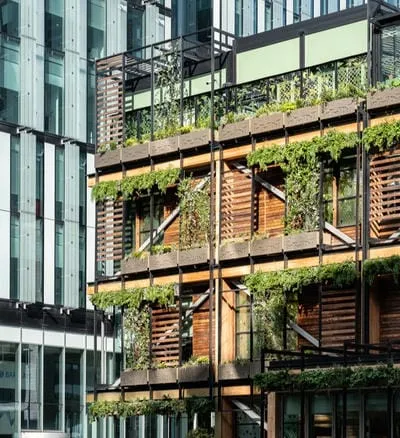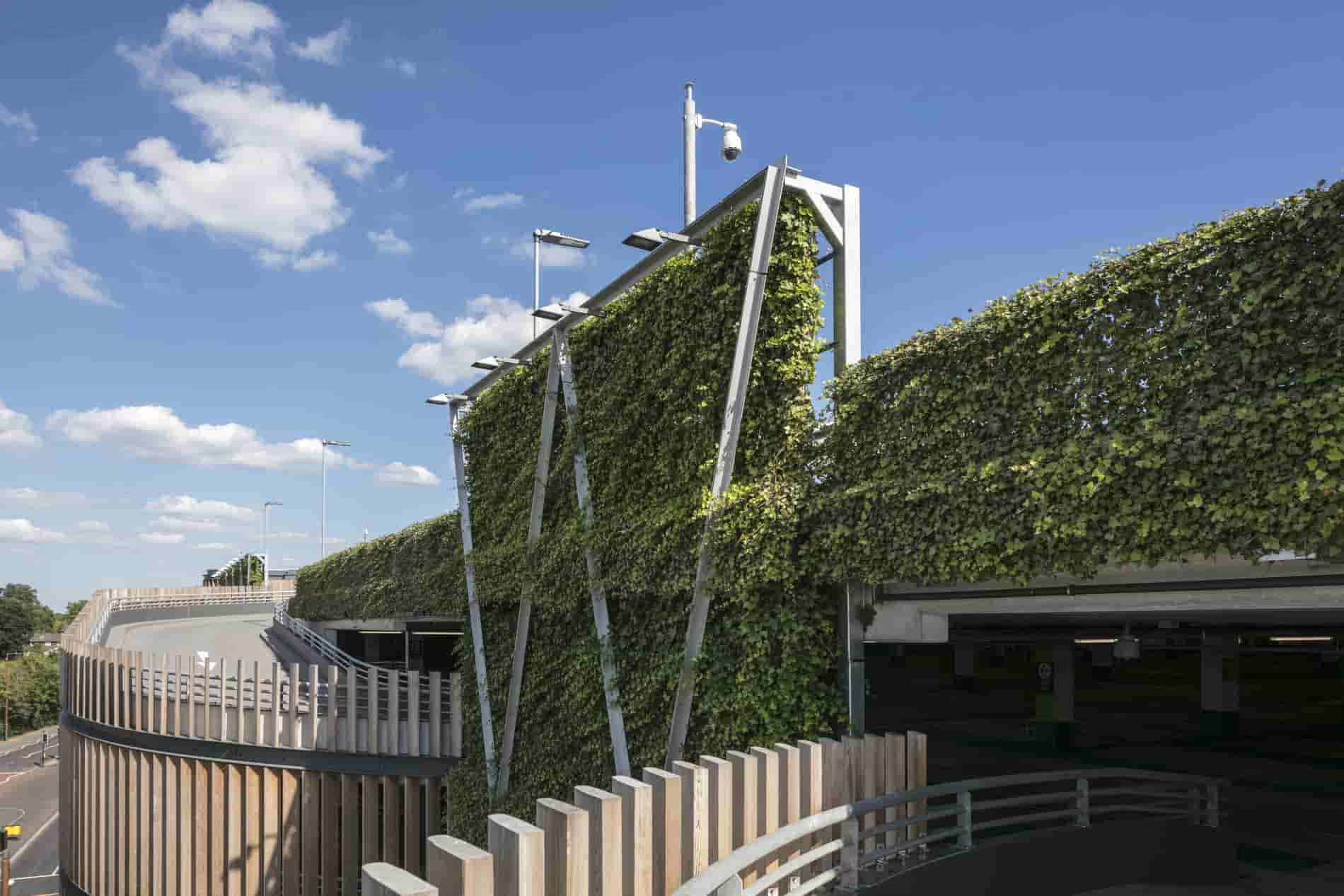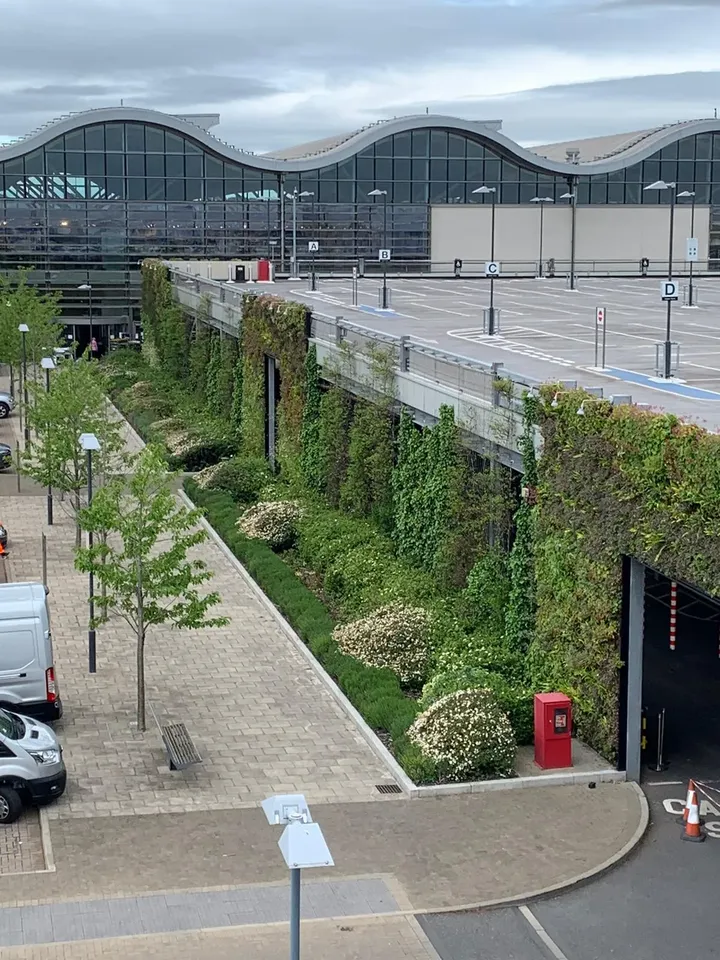Facade Planters
The cost-effective, stackable alternative to intensive living walls. Our façade planters are the modular, stackable solution to large-scale vertical greening where cost and airflow are key considerations.

What are façade planters?
Designed to green large vertical surfaces, facade planters are individual troughs installed in a grid layout. When planted with climbers or trailing species, they enable façade coverage without compromising airflow or racking up unnecessary costs.

Why choose façade planters?
Ideal for sites where modular living walls may not be practical, our facade planters offer a versatile and efficient way to add greenery to large surface areas.
Cost-effective and scalable
A straightforward solution when budgets are tight or coverage needs to be extended across expansive facades.
Supports airflow and ventilation
Allows airflow through the structure, making it a natural fit for car parks and other spaces where ventilation is essential.
Lower water usage
Less substrate, fewer layers, and drought-tolerant species mean reduced irrigation requirements.

Stackable and modular
Stackable units create a cohesive visual effect and can be easily integrated with modular living walls or other planting systems.

Ideal applications for façade planters
Not all green walls are truly sustainable infrastructure. With special attention to factors like irrigation, plant species, and building materials, we’ve designed our living walls to give more than they take and last the lifetime of the building.
Car parks
A breathable green facade system that doesn’t interfere with ventilation. Double-sided greenery possible.
Commercial buildings
Cost-conscious but large-scale? Façade planters allow extensive coverage without the engineering load of a modular living wall system.
Hybrid schemes
Their modular format allows the planters to be stacked vertically, enabling custom coverage of building facades. And because they're individual units, they can be easily integrated with other Viritopia greening systems for a cohesive finish.

Viritopia’s façade planter projects
See how façade planters have been used to green structures creatively and effectively, whether on their own or as part of a wider biophilic strategy.
Biophilic design in the heart of Manchester
We delivered a layered façade of planters, gabions and rooftop greenery to support a vibrant biophilic design in the heart of Spinningfields.

Sustainable retail at scale
Living walls were installed around the car park to help improve air quality and support M&S’s eco-store goals.

Purifying the air in a school playground
We helped turn one of London’s most polluted playgrounds into a lush, biodiverse space with a 400ft living wall that we continue to maintain.

Frequently asked questions
Find answers to common questions about our façade planters.
How are façade planters installed?
They are fixed directly to the building facade or a supporting frame, depending on the substrate and structural requirements of the project. Our team provides full installation guidance based on site conditions.
Can façade planters be combined with other living wall systems?
Yes. We often use façade planters alongside our modular living wall system to create varied textures, patterns or to meet specific project requirements — like ventilation or budget constraints.
What are the sustainability benefits of façade planters?
When budget or simplicity is a priority, our façade planters can:
- Improve biodiversity, though not to the same extent as our full living wall system.
- Help meet urban greening targets and biodiversity net gain.
- Promote cooling, shading and noise buffering in urban spaces.
Do façade planters require irrigation?
Yes, but less than intensive living wall systems. Irrigation design depends on the chosen plant species, climate, and size of installation, and is integrated into the overall system design.
What kind of plants work best in façade planters?
Typically, climbing or trailing species such as Hedera helix (ivy), Trachelospermum jasminoides (star jasmine), or native pollinator-friendly species. Selection depends on project goals, aspect, coverage requirements vand local climate.
Are façade planters suitable for new builds and retrofits?
Yes, they can be designed into new architecture or retrofitted onto existing buildings, making them a flexible option across project types.
Looking for a simple green façade?
We’ll help you assess if façade planters are the right fit and how they could work alongside other green systems on your site with a free feasibility report.

